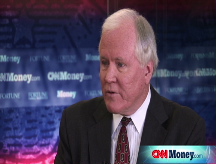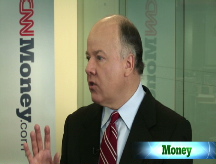Bernanke: It's time for stimulus plan
Fed chief says lawmakers should consider another plan to boost economy. He cites risk of 'protracted slowdown.'
NEW YORK (CNNMoney.com) -- Federal Reserve Chairman Ben Bernanke testified Monday that Congress should consider passing a new stimulus package to try to jump start the economy.
Bernanke, speaking before the House Budget Committee, came just short of an outright endorsement of a package to pump tax dollars into the economy. But he clearly said the economy needs additional help from Congress.
"With the economy likely to be weak for several quarters, and with some risk of a protracted slowdown, consideration of a fiscal package by the Congress at this juncture seems appropriate," he said.
Experts said Bernanke's testimony gives an important lift to the chances that Congress will pass some sort of stimulus package, perhaps in a lame duck session after the November election and before the new Congress takes office in January.
"Effectively, the Fed chairman is giving Congress a green light to go ahead with an additional fiscal stimulus package," said Brian Bethune, chief U.S. financial economist for research firm Global Insight.
Earlier this year, Congress approved a $170 billion plan - nearly $100 billion in payments to tax filers - to boost consumer and business spending. Talk has grown louder in recent weeks in Washington and on the presidential campaign trail for further steps including an extension of unemployment benefits, infrastructure spending and other measures.
Bernanke's comments were cheered by House Speaker Nancy Pelosi, D-Calif.
"Chairman Bernanke added his voice to the chorus of economists, experts and policymakers who insist that America needs a job-creating recovery package to get our economy back on track and to restore consumer and investor confidence," said a statement released by her office.
The Bush administration said it was open to discussing a new stimulus package with lawmakers but said it did not see Bernanke's statements as a blanket endorsement of any plan proposed so far by Congress.
"I think we just need to wait and see," said White House spokeswoman Dana Perino. "We're open to ideas and we'll take a look at what comes our way."
Bernanke, who with Treasury Secretary Henry Paulson has led the government's extraordinary efforts in recent weeks to stem the financial crisis, was asked by Rep. Rosa DeLauro, D-Conn., whether the economy is in a recession.
"We are in a serious slowdown," Bernanke said, refusing to give the yes-or-no answer DeLauro said she wanted.
He said "recession" is a technical description of economic conditions. "Whether it's called a recession or not is of no consequence," Bernanke said.
Some economists saw Bernanke's comments as his most dire assessment yet of the U.S. economy.
"The Fed has accepted that the rate cuts and actions, even if they are of help to the financial sector, will not be adequate to stabilize the economy," said Arpitha Bykere, economic analyst for RGE Monitor.
Most of Bernanke's nearly 90-minute appearance focused on economic stimulus. He said that Congress should consider another measure but nonetheless declined to say how much money should be spent. He said that's a decision for Congress, not the Federal Reserve.
Bernanke suggested Monday that any stimulus program should be activated as quickly as possible to boost the economy when it is facing its greatest period of weakness.
In addition, Congress should weigh whether to make credit more available to consumers, homeowners, businesses and other borrowers, Bernanke said. He said that loan guarantees and direct lending by government are among the ways lawmakers can get credit flowing again.
Democrats have been pushing for a second stimulus package for months. Among the proposals they've put forward: extend jobless benefits, increase food stamps, invest in infrastructure projects and impose a requirement for a foreclosure moratorium.
Republicans have made their own proposals, which focus more on tax breaks than direct payments. Among them, reduce or suspend the capital gains tax and offer a bigger tax break for home buyers.
The presidential candidates, whose crisis-related stimulus plans largely differ from one another, nevertheless both call for suspending the income tax on unemployment benefits and temporarily exempting seniors over 70-1/2 from having to make withdrawals from their IRAs and 401(k)s.
At Monday's hearing, Rep. Brian Baird, D-Wash, pushed Bernanke about the value of spending on infrastructure projects, such as roads and water projects. Such projects have economic value, but it generally takes a long time for spending on such projects to get into the system, Bernanke said. Baird responded that in his district and across the country there are many projects ready to go and lacking only funding.
Lawmakers also questioned Bernanke about the need to help state and local governments avoid budget cuts. The federal government could loan states money at significantly lower rates than available in the financial markets, he said. ![]()






